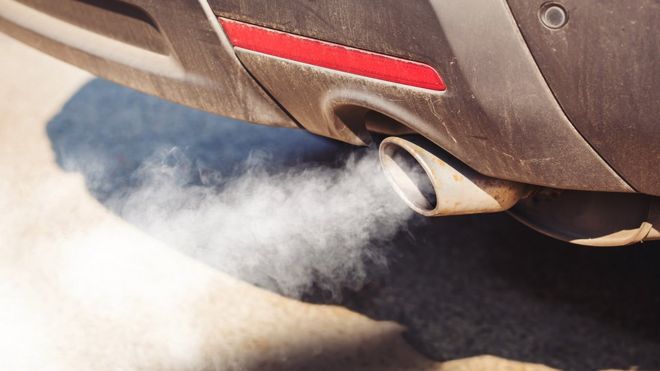Schools should have 'no idling zones', Public Health England chief says

 11 March 2019
11 March 2019Public health chiefs have proposed a ban on cars idling outside school gates in a bid to cut air pollution.
The measure is among a series of UK-wide recommendations put forward by Public Health England.
PHE medical director Paul Cosford told the BBC: "We should stop idling outside schools and we should make sure that children can walk or cycle to school."
PHE said 28,000 to 36,000 deaths a year in the UK could be attributed to long-term exposure to air pollution.
The report said local authorities could implement no-idling zones in areas with vulnerable hotspots such as schools, hospitals and care homes.
It also recommends a wider uptake of low emission or clean air zones to discourage the most highly polluting vehicles from entering populated areas.
It describes air pollution as the biggest environmental threat to health in the UK and says there is strong evidence that air pollution causes the development of coronary heart disease, stroke, respiratory disease and lung cancer, and exacerbates asthma.
Although England, Scotland, Northern Ireland and Wales lead on air quality policy in their own territories, PHE contributes to the implementation of the government's UK-wide strategy.
Professor Cosford told BBC Radio 5 Live conversations needed to be had between local authorities, schools and parents about how to "stop the emissions at source".
The PHE review also recommends:
- Redesigning cities so people aren't so close to highly polluting roads by, for example, designing wider streets or using hedges to screen against pollutants
- Investing more in clean public transport as well as foot and cycle paths
- Encouraging uptake of low emission vehicles by setting more ambitious targets for installing electric car charging points
- Discouraging highly polluting vehicles from entering populated areas with incentives such as low emission or clean air zones
l
Prof Cosford said: "Transport and urban planners will need to work together with others involved in air pollution to ensure that new initiatives have a positive impact.
"Decision makers should carefully design policies to make sure that the poorest in society are protected against the financial implications of new schemes."
PHE said that national government policy could support these local actions - for example, they could allow controls on industrial emissions in populated areas to take account of health impacts.
